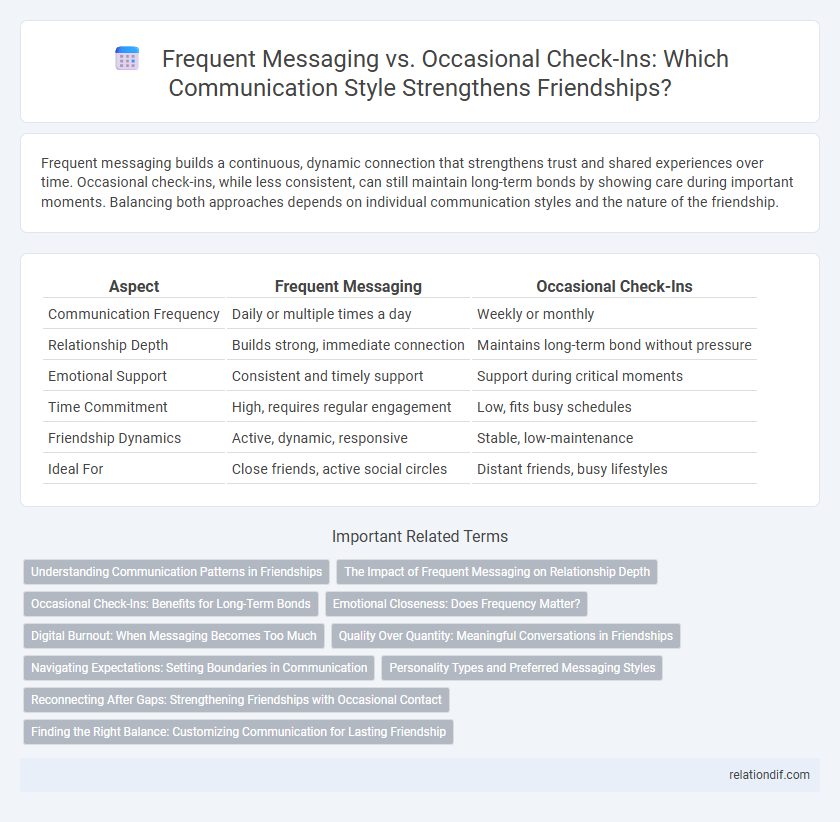Frequent messaging builds a continuous, dynamic connection that strengthens trust and shared experiences over time. Occasional check-ins, while less consistent, can still maintain long-term bonds by showing care during important moments. Balancing both approaches depends on individual communication styles and the nature of the friendship.
Table of Comparison
| Aspect | Frequent Messaging | Occasional Check-Ins |
|---|---|---|
| Communication Frequency | Daily or multiple times a day | Weekly or monthly |
| Relationship Depth | Builds strong, immediate connection | Maintains long-term bond without pressure |
| Emotional Support | Consistent and timely support | Support during critical moments |
| Time Commitment | High, requires regular engagement | Low, fits busy schedules |
| Friendship Dynamics | Active, dynamic, responsive | Stable, low-maintenance |
| Ideal For | Close friends, active social circles | Distant friends, busy lifestyles |
Understanding Communication Patterns in Friendships
Frequent messaging in friendships enhances real-time connection and emotional support by maintaining daily touchpoints, vital for sustaining closeness. Occasional check-ins, often spaced by days or weeks, reflect deeper trust and comfort with less frequent but meaningful interactions. Understanding communication patterns in friendships reveals how different styles balance intimacy and independence, shaping relationship dynamics.
The Impact of Frequent Messaging on Relationship Depth
Frequent messaging fosters continuous emotional connection and builds trust, enhancing relationship depth by maintaining regular communication and shared experiences. It enables instant support and immediate responses, which reinforce intimacy and understanding between friends. Conversely, occasional check-ins might limit the opportunity for spontaneous interactions, potentially weakening the sense of closeness and rapport over time.
Occasional Check-Ins: Benefits for Long-Term Bonds
Occasional check-ins foster enduring friendships by allowing meaningful conversations without overwhelming daily communication, creating space for authenticity and reflection. This balanced approach reduces pressure and prevents burnout, promoting sustained emotional connection over time. Periodic contact underscores genuine interest and trust, reinforcing long-term bonds through thoughtful presence rather than constant messaging.
Emotional Closeness: Does Frequency Matter?
Frequent messaging fosters a consistent exchange of thoughts and feelings, enhancing emotional closeness by maintaining a steady presence in each other's lives. Occasional check-ins, though less frequent, can still sustain strong bonds if the interactions are meaningful and convey genuine care. Emotional closeness depends more on the quality and authenticity of communication than the quantity of messages exchanged.
Digital Burnout: When Messaging Becomes Too Much
Frequent messaging in digital friendships can lead to digital burnout, causing stress and anxiety as constant notifications overwhelm mental space. Occasional check-ins offer a balanced approach, allowing meaningful connection while preserving emotional well-being and reducing screen fatigue. Managing communication frequency ensures friendships remain supportive without becoming a source of digital exhaustion.
Quality Over Quantity: Meaningful Conversations in Friendships
Frequent messaging can build a sense of closeness, but meaningful conversations during occasional check-ins strengthen emotional bonds more effectively. Focusing on quality over quantity fosters deeper understanding, empathy, and trust in friendships. Prioritizing thoughtful, intentional communication enhances the overall connection between friends beyond mere message volume.
Navigating Expectations: Setting Boundaries in Communication
Establishing clear boundaries in friendship communication helps balance frequent messaging and occasional check-ins, ensuring mutual respect for personal space and time. Understanding each other's communication preferences reduces misunderstandings and maintains a healthy connection. Consistent yet flexible dialogue fosters trust and prevents feelings of neglect or overwhelm.
Personality Types and Preferred Messaging Styles
Frequent messaging aligns with extroverted and expressive personality types who thrive on constant social interaction, while introverted or reserved individuals often prefer occasional check-ins to maintain connection without feeling overwhelmed. Understanding preferred messaging styles, such as direct texts for pragmatic types versus emotive or detailed messages for empathetic friends, enhances communication effectiveness. Tailoring message frequency and style based on personality traits fosters stronger and more meaningful friendships.
Reconnecting After Gaps: Strengthening Friendships with Occasional Contact
Reconnecting after gaps through occasional check-ins fosters genuine friendship by prioritizing quality over quantity in communication. These meaningful touchpoints remind friends of shared values and experiences, reinforcing emotional bonds despite less frequent contact. Occasional messaging reduces pressure, allowing relationships to grow organically, emphasizing understanding and support even during busy or distant phases.
Finding the Right Balance: Customizing Communication for Lasting Friendship
Frequent messaging nurtures closeness through consistent interaction, yet occasional check-ins provide space for personal growth and reflection, both essential for a balanced friendship. Tailoring communication frequency to individual preferences and life circumstances strengthens trust and understanding, fostering deeper connections. Prioritizing quality over quantity in messages ensures meaningful exchanges that sustain lasting friendships.
frequent messaging vs occasional check-ins Infographic

 relationdif.com
relationdif.com